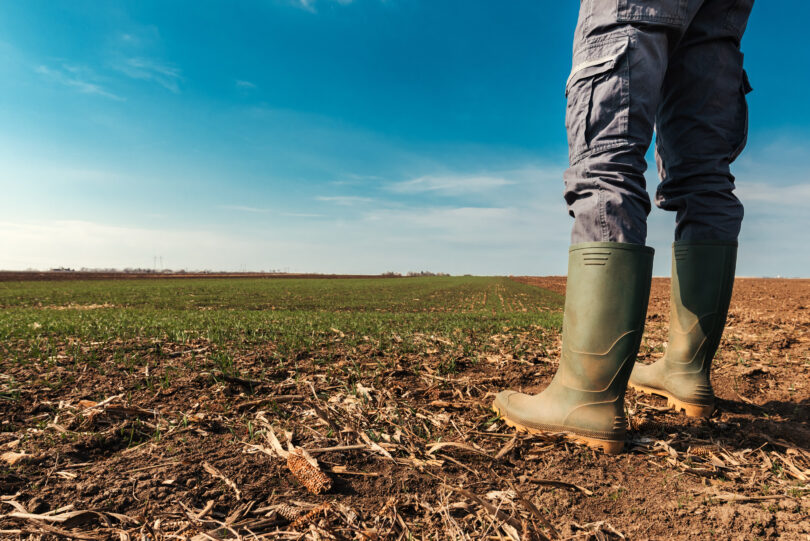The Sustainable Soils Alliance is helping families make merry and mindful meal choices with a guide which highlights 12 soil-friendly changes to their festive feasts.
The guide emphasises the importance of selecting seasonal, local, and regeneratively farmed foods with twelve actionable changes to Christmas meals, such as choosing pasture-fed meat, seasonal and local vegetables, and regenerative grains.
Reducing waste means less pressure on farmland, lower production demands, and ultimately more resilient and biodiverse soils.
Wet weather and unsustainable farming practices have put Britain’s soil under strain, threatening food security, biodiversity and carbon sequestration efforts – as well as driving prices higher.
Matthew Orman from the Sustainable Soils Alliance said: “Small changes in what we eat and how we shop can make a big impact. This Christmas, we’re encouraging people to choose foods that support British farmers using evidence-based regenerative and sustainable farming practices. From home-made cranberry sauce made from perennial berries to regeneratively-grown potatoes, these choices help protect our soils and secure a more sustainable and more resilient future.”
The Sustainable Soils Alliance’s campaign is part-supported by Subak’s Impact Lab, which funds and convenes climate-focused groups to address urgent sectoral missions.
Through collaborations with Nature-Friendly Farming Network and UK Youth 4 Nature, the Impact Lab aims to drive systemic change in agriculture and land use, advancing the adoption of evidence-based regenerative practices.”
Pranuthi Chander, COO of Subak, commented: “Christmas dinner is the most seasonal meal of the year – root vegetables and winter greens are at its heart.
“Intensive meat production is harmful to the planet, but this guide shows that making soil-friendly choices this Christmas doesn’t mean your dinner is going to be dull.
“And if you do end up with more food than you need, everyone loves leftovers so you can do your bit to bring food waste down.”
12 changes you could make to your Christmas lunch which will benefit British farmland
- If you plan to eat meat, choose pasture-fed
Why it’s better: Pasture-fed livestock, such as beef and lamb, are raised on grasslands managed through rotational grazing. This approach mimics natural herd movements during Spring and Summer, allowing pasture plants to regrow and build stronger root systems. As a result, soil organic matter increases, which enhances water retention, reduces erosion, and sequesters carbon.
- Buy Locally Sourced, Organic Vegetables
Why it’s better: Organic farming systems use compost, manure, and cover crops to enrich soil health and prioritise soil-building practices that enhance earthworm populations and microbial diversity.
- Include Seasonal British Produce
Why it’s better: Seasonal crops such as parsnips, Brussels sprouts, and carrots align with the natural growing cycles in the UK, reducing reliance on heated greenhouses or imported produce. A farmer growing winter vegetables may follow them with nitrogen-fixing legumes in the spring, enriching the soil without synthetic fertilisers.
- Switch to Regeneratively-Grown Grains
Why it’s better: Regenerative farming of grains like wheat, barley, and oats favour no-till or reduced-tillage methods, which leave soil undisturbed, protecting its structure and reducing carbon and emissions from soil disruption when part of a holistic soil husbandry strategy. These grains are often cultivated in mixed farming systems that integrate livestock, further improving soil nutrient cycling and biodiversity.
- Pick Regenerative Wines or Ciders
Why it’s better: Vineyards and orchards implementing evidence-based regenerative practices use cover crops and minimal tillage to protect the soil. Cover crops like clover or vetch between vines prevent erosion, fix nitrogen, and attract pollinators.
- Include Perennial Crops
Why it’s better: Perennial crops – plants which live for more than two years – like berries (currants, gooseberries) require less tillage than annual crops, reducing soil disruption. These crops also have deep root systems that stabilise soil, improve water infiltration and store carbon.
- Choose Sustainably Farmed Seafood
Why it’s better: While seafood is not directly tied to soil, sustainable aquaculture and integrated systems like aquaculture protect coastal soils and reduce pressures on farmland.
- Minimise Food Waste
Why it’s better: Food waste directly impacts farmland by increasing the demand for overproduction, which can lead to soil exhaustion and nutrient depletion. By consciously avoiding food waste, families can allow farmers to focus on quality rather than maximum yield.
- Try Legume-Based Dishes
Why it’s better: Legumes such as lentils, chickpeas, and beans are “nitrogen fixers,” meaning they convert atmospheric nitrogen into forms usable by plants, naturally fertilising the soil. Adding these to your meal supports farms practicing legume crop rotation reducing dependency on synthetic fertilisers.
- Make Homemade Sauces
Why it’s better: Mass-produced sauces often contain ingredients like palm oil or imported vegetables and intensively farmed fruit. Homemade sauces using local ingredients – British apple sauce – supports UK orchards which often employ integrated pest management, which improves biodiversity.
- Choose Regeneratively-Grown Potatoes
Why it’s better: Potatoes are a staple of Christmas dinners, but conventional production can lead to soil compaction and erosion. Regeneratively grown potatoes are cultivated using practices like strip-tilling or mulching, which protect soil structure.
- Use Locally Made Plant-Based Alternatives
Why it’s better: Many plant-based meat substitutes rely on soy or pea protein imported from large-scale farms overseas, often linked to deforestation and soil degradation. Opting for options like nut roasts or mushroom-based dishes encourages British growers using sustainable methods.
The Sustainable Soils Alliance, alongside Subak partners such as the Nature Friendly Farming Network and UK Youth 4 Nature, is working to inform policy and encourage a transition to evidence-based regenerative agriculture.
Practical steps like rotational grazing, cover cropping, and reducing chemical inputs are central to their mission. These practices not only improve soil resilience but also help farmers reduce their carbon emissions—key to achieving the UK’s climate goals.







